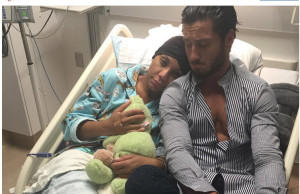Lisa Rinna and Brooke Shields on Postpartum Depression

Dancing with the Stars contestant, Lisa Rinna, was on the Today show this morning promoting her new book Rinnavation, Getting Your Best Life Ever. Originally planned as a diet and exercise book, it morphed into a semi-autobiography self-help book. One issue that Lisa talks openly about is her bouts of postpartum depression after the births of both of her children. She says that she was troubled with visions of knives and guns and was afraid that she might harm her children or her husband, actor Harry Hamlin. Fortunately, with treatment, she was able to get through those dark times. Brooke Shields is another actress who has made public her struggles with post-partum depression in her book Down Came the Rain.
Many women suffer from what is called “baby blues” after the birth of a child. The new mom may feel sad, anxious, or overwhelmed and have crying spells and mood swings. This may be accompanied by loss of appetite and trouble sleeping. The symptoms are relatively mild, and resolve with the first two weeks after birth.
Aproximately 10% of new moms will go on to have postpartum depression. The symptoms are more severe, do not resolve in a short period of time, and may occur any time within the first year after birth. In addition, there may be more troubling symptoms such as thoughts of hurting the baby or oneself, as well as not having any interest in the baby.
There may be a number of factors that contribute to postpartum depression. First, Levels of hormones (progesterone, estrogen, thyroid hormone) that are normally high during pregnancy, drop dramatically in the first 24 hrs after birth and can cause mood swings and depression. Stressful physical changes such as anemia, fatigue and pain from the birth process can also contribute. Emotional factors, such as lack of support from family or friends, feelings of inadequacy as a mother and stress from changes in daily routine make matters worse. A previous history of depression and having multiple births also increases the risk of postpartum depression.
A small number of new mothers experience a more serious condition known as postpartum psychosis that includes symptoms of confusion, hallucinations and even attempts to harm herself or her child. A tragic example of this is the case of Andrea Yates who killed her five children in June of 2001 and was found not guilty by reason of insanity. There is currently a bill in the Texas legislature that would officially recognize postpartum mental illness as a legal defense for women who kill their children.
Postpartum depression is a serious condition and must be treated by a physician. Treatment can consist of talk therapy, medication or both.
Click below for more information
[AMAZONPRODUCT=1416948635] [AMAZONPRODUCT=1401308465] [AMAZONPRODUCT=0061253111] [AMAZONPRODUCT=0061724459]



























1 Comment